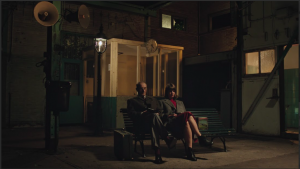
Posoki
| Director | Stephan Komandarev |
| Writer | Simeon Ventsislavov, Stephan Komandarev |
| Cast | Anna Komandareva, Vassil Vasilev–Zuek, Ivan Barnev, Borislava Stratieva, Georgi Kadurin, Assen Blatechki, Irini Jambonas, Vasil Banov |
| Camera | Vesselin Hristov |
| Editor | Nina Altaparmakova |
| Producer | Stephan Komandarev, Katya Trichkova – Argo Film; Stelios Ziannis, Vera Weit – Aktis Film Production; Vladimir Anastasov, Angela Nestorovska – Sektor Film Production; Bulgarian National Television, Digital Images, Contrast Films |
| International Title | DIRECTIONS |
| Year | 2017 |
| Length | 103 min |
| Country | Bulgaria, Germany, Macedonia |
| Subtitles | English |
| Section | EXCITING, CURRENT CINEMA |
| Screening | Saturday 10 November | 19:15 hours | Filmhuis Den Haag |
A bitter-humoured realistic drama in which the fate of various people’s lives collides and gets affected during each individual taxi ride. All are victims of the decline of a suffering nation. Dutch Premiere
Synopsis
A road movie through the dystopia of Bulgaria today, a country that remains optimistic because all realists and pessimists have left it. During an appointment with his banker, the owner of a small business, who drives a taxi to make ends meet, discovers that the bribe he will have to pay to obtain a loan has doubled. The ethics board that examined his blackmail complaint is now asking for his share. Not knowing which saint to devote himself to, the owner kills the banker and commits suicide. This incident has sparked a national radio debate about the despair that reigns in civil society. Meanwhile, five taxi drivers and their passengers move through the night, each hoping to find a clearer way forward.
Festivals & Awards (selection)
Sarajevo FF, 2017 – Special Jury Mention | CinEast FF, 2017 – Critic’s Prize | Haifa IFF, 2017 – Special Jury Mention | Gijón IFF, 2017 – Best Script | Brussels IFF, 2018 – International Audience Award | Cannes FF, 2017 – Official Selection Un Certain Regard
Director’s statement
This film was ‘born’ on a cold day in January 2015, on the back seat of a taxi. I remember the driver telling me that the driving in Sofia functions practically as a unit of Bulgarian social services; when one loses their job, which is the case more and more often, they find a new job as a taxi driver. My companion was a professor in nuclear physics from the Bulgarian Academy of Science, recently dismissed from work. He told me stories about his colleagues – professional teachers, priests, musicians, ex-military officers, who drive taxies at night – struggling to survive and pay their bills. He told me a joke about Bulgaria being a country full of optimists, as the realists and pessimists left long ago.









